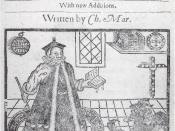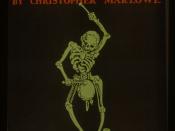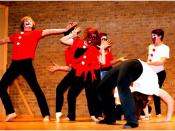The central theme in Christopher Marlowe's Doctor Faustus is the clash between the medieval world and the world of the emerging Renaissance. The Renaissance was a movement that began in Italy in the 15th century and spread throughout Europe, carrying with it a new emphasis on the individual, on classical learning, and on scientific inquiry into the nature of the world. In the medieval academy, theology was the penultimate science, placing God at the center of existence. Humanism was the spirit of learning that developed with the revival of classical letters and a renewed confidence in the ability of human beings to determine for themselves truth and falsehood. Faustus's quest for limitless knowledge is not fueled by a desire to better humanity, but is borne rather of self serving ego.
The title character, Faustus is a magician rather than a scientist, a blurred distinction in the 16th century. He explicitly rejects the medieval model in his opening speech, going through every field of scholarship.
In the medieval model, tradition and authority, not individual inquiry, were key. Yet in this soliloquy, Faustus considers and rejects this medieval way of thinking. He resolves, in full Renaissance spirit, to accept no limits, traditions, or authorities in his quest for knowledge, wealth, and power.
Before he agrees to the pact with the Devil, Faustus is full of ideas for how to use the power that he seeks. He imagines amassing great wealth, but he also aspires to plumb the mysteries of the universe and to alter the map of Europe. Though they may not be entirely admirable, these plans are ambitious and inspire awe, if not sympathy. They lend a grandeur to Faustus's schemes and make his quest for personal power seem almost heroic, a sense that is reinforced by the eloquence of his...


